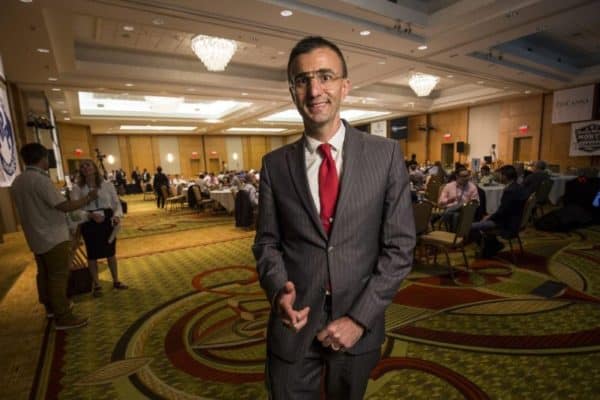

The legalization of recreational marijuana may be now just a few months away, but for those Canadians not interested in smoking their pot, the wait will be longer still. Too bad, say proponents for cannabis edibles and beverages, since eating or drinking your weed is better for your health.
Dooma Wendschuh is co-founder and CEO of Province Brands of Canada, an adult beverage company based in Toronto, now looking to break into the cannabis market with a pot-brewed beer. “We’ve made a number of prototypes so far,” he says. “They have a rich, nutty and savoury flavour.”
Wendschuh is talking about beer made from cannabis —not cannabis-infused beer, which already exists in both THC- and CBD-laden varieties— but the first beer actually brewed from the cannabis plant instead of the usual barley.
“Other companies are making non-alcoholic beer with cannabis oil,” says Wendschuh in conversation with Cantech Letter. “We’ll also have products like that in the future, but what makes us really special are the cannabis-brewed beers.”
Last month, Province Brands got a big vote of confidence in the form of a partnership agreement with marijuana space investors Cannabis Wheaton, one which will see the latter acquire a ten per cent equity ownership in Province Brands.
In a press release to mark the occasion, Hugo Alves, president of Cannabis Wheaton, said that so-called drinkables will eventually play a huge role in the cannabis industry, ultimately disrupting the alcohol industry. “We look forward to partnering with Province and helping them build an industry-leading global brand in the cannabis beverage vertical,” says Alves.

As it turns out, Province Brands will have plenty of time to perfect its craft, since the timeline for edible and drinkable forms of marijuana has been pushed to one year post legalization, which, if all goes well with Bill C-45, likely means at least late summer of 2019.
Last October, the Liberal government amended the proposed legislation to contain the lag time for edibles and other concentrated forms of cannabis, with the reasoning being that it will give regulators enough time to get the dosage and food safety logistics right.
But critics have said that’s not good enough, as edibles and concentrates are not only healthier than smoked cannabis but are the preference of at least one-third of pot users, meaning that the delay is bound to keep a good chunk of users linked to the black market.
“This stance will effectively mean that Canada will only partially legalize cannabis for recreational use and leave a significant sector as illegal and lacking any responsible regulatory oversight. This contradicts the government’s stated policy goal,” wrote Shane Morris, VP of product development for Aurora Cannabis, in a submission last fall to the House of Commons Standing Committee on Health. “If edibles remain unregulated and their illicit use increase, it will only be a matter of time until a high profile public health issue occurs,” writes Morris.
But concerns over the legalization of edibles persist, with critics arguing that there could be a higher risk of overuse for novice users who may not be as careful with their consumption as they might be through smoking marijuana, especially since the high from eating or drinking pot is slower-acting than from smoking and longer-lasting than the more familiar intoxication from alcohol.
Indeed, these are issues Wendschuh is grappling with regarding his cannabis beer. “Normally, when you consume a marijuana beverage it can take an hour or two for it to hit you, which is a really long time and a normal marijuana beverage will keep you intoxicated for around six hours or more,” he says.
“[With alcohol] we might like to try two or three beers over the course of the evening or in other cases be able to drive home after a night out and not wait six hours until the intoxication subsides,” he says. “Ultimately, we’re looking to curb that six-hour period and mimic the dose response curve of alcohol.”
At the same time, the issues concerning edibles and overuse are real. Dr. Patricia Daly is Chief Medical Health Officer with Vancouver Coastal Health who spoke in 2016 about an instance where of the 63 people admitted to St. Paul’s Hospital in Vancouver for a pot overdose following a 4/20 celebration, about 70 per cent had been eating pot instead of smoking it.
“I think we have to think carefully about what format we’d like to have edibles available,” said Dr. Patricia Daly in an interview with CBC News.
Which is why getting a regulatory framework up and running is crucial, proponents say, as proper labelling of edibles, complete with THC content and intoxicant warnings, will make a difference.
That will be the challenge for government regulators over the next year and a half, says Wendschuh. “Our hopes are that the government stays on schedule and doesn’t further delay the legalization [of consumables]. They’re a healthier alternative to alcohol,” he says.
Leave a Reply
You must be logged in to post a comment.




 Share
Share Tweet
Tweet Share
Share




Comment